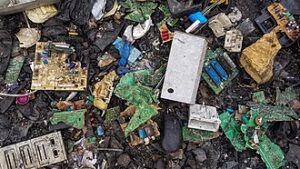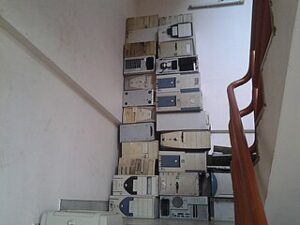No waste stream grows as fast as electronic waste or e-waste. Recycling companies now pay attention to it. They can recover gold, copper and nickel from it, among others. Hannah van der Korput write an article about this on the site of change.inc (in Dutch).

Electronic waste
The world produces an increasing amount of electronic waste. In 2022 that amounted to 63 million tons. 80% over the 2010 amount. This fast growth can be partly attributed to the quick renewal of equipment; and this again is the result of continuous product development with short innovation cycles. Therefore, the average age of equipment falls, and the amount of waste rises. And that’s why now about 70% of toxic waste consists of electronic waste.
Often, electronic waste isn’t processed in its country of origin. Three quarters of all discarded telephones, computers and kitchen equipment is being exported abroad; to Africa for instance. There they try to dismantle the equipment, to burn it and to recover valuable feedstock. But modern equipment can contain a large number of elements; very rarely, they are developed with an eye on possible reuse or recycling. As a consequence, in Africa there now develop major waste heaps containing toxic waste. Locally, soil and air get contaminated.
We can only recover electronic waste on the basis of good legislation. If there are no rules to channel this, much electronic waste will be added to the general waste stream. Often, this will be incinerated, causing many valuable resources to disappear. Whereas these waste streams contain major amounts of valuable materials.

Recycling
But some try to change this. Change.inc mentions Joost de Kluijver. An entrepreneur who resists pointing fingers at each other, when it comes to waste treatment. ‘E-wate is the result of an industry that gave a major boost to global development, and still does…. But then, apparatus breaks down, and we judge that someone else will have to take care of that.’ Joost intends to show the world ‘that one can collect e-waste, recover mineral resources from it, and earn a living in doing so.’
Stefan de Linde has the same philosophy. With his company Minimise he constructs a professional and documented recycling of electronic waste, among others in Ghana. His company works together with local recycling centres and communities; in doing so he prevents electronic equipment to be added to general waste. He pays his workers to collect and recycle equipment in the proper way; this adds substantially to the amount of recycling of valuable materials.
Refrigerators
Refrigerators and freezers also belong to the category of e-waste. Coolrec, a daughter company to recycler Renewi, collects them. Refrigerators consist of 20% plastics. One of the major challenges of plastic recycling is to find high-quality applications for discarded plastic; in other words upgrading instead of downgrading. They succeeded there: old refrigerators are now turned into Playmobil toys. The recycled plastic is of the same quality as new plastic from crude oil; but it is a lot more sustainable. Coolrec intends to collect much more consumer electronic equipment and process it into valuable resources. Like from drilling machines, computers and washing machines. All this equipment contains plastics that can be processed into new high-value applications.
Repair and reuse will also be able to diminish the amount of electronic waste. This is the business of ICT company Digi Surfer. They refurbish laptops for reuse, preventing them from being added to the waste heap. The company mainly refurbishes business tablets. These age quickly, and lose their market value in the process. But Digi Surfer refurbishes them into creative and educational instruments. They are exported to Ivory Coast, where they can serve quite a while at schools, as educational material.
Problems
But still, major amounts of electronic waste end up in the bin. Problems in addressing proper reuse are above all the complexity of the equipment to be treated, inadequate collection and above all the lack of good processing techniques. That was a subject that we didn’t address in developing these products. We urgently need new techniques, both in design and in processing the waste. And good international agreements, in order to prevent the pile of electronic waste to grow all the time, especially in countries without proper legislation.
Interesting? Then also read:
Plastic recycling: many technologies available, no winner, says Lux Research
Towards zero plastic waste in 2050
Plastics to virgin materials
